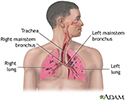Psittacosis
Ornithosis; Parrot pneumonia
Psittacosis is an infection caused by Chlamydia psittaci, a type of bacteria found in the droppings of birds. Birds spread the infection to humans.
Causes
Psittacosis infection develops when you breathe in (inhale) the bacteria. While anyone can get psittacosis, it is more common in adults.
People at high risk for this disease include:
- Bird owners
- Pet shop employees
- People who work in poultry processing plants
- Veterinarians
Typical birds involved are parrots, parakeets, and budgerigars, although other birds have also caused the disease.
Psittacosis is a rare disease. Very few cases are reported each year in the United States.
Symptoms
The incubation period of psittacosis is 5 to 15 days. The incubation period is the time it takes for symptoms to appear after being exposed to the bacteria.
Symptoms may include:
- Blood-tinged sputum
- Dry cough
- Fatigue
- Fever and chills
- Headache
- Joint aches
- Muscle aches (most often in the head and neck)
- Shortness of breath
- Diarrhea
- Swelling in the back of the throat (pharyngitis)
- Inflammation of the liver
- Confusion
Exams and Tests
Your health care provider will hear abnormal lung sounds such as crackles and decreased breath sounds when listening to the chest with a stethoscope.
Tests that may be done include:
- Antibody titer (rising titer over time is a sign of infection)
- Blood culture
- Sputum culture
- X-ray of the chest
- Complete blood count (CBC)
- CT scan of the chest
Treatment
The infection is treated with antibiotics. Doxycycline is used first. Other antibiotics that may be given include:
- Macrolides
- Fluoroquinolones
- Other tetracycline antibiotics
Note: Tetracycline and doxycycline by mouth are usually not given to children until after all their permanent teeth have started to grow in, because they can permanently discolor teeth that are still forming. These medicines are also not given to pregnant women. Other antibiotics are used in these situations.
Outlook (Prognosis)
A full recovery is expected if you do not have any other conditions that affect your health.
Possible Complications
Complications of psittacosis may include:
- Brain involvement
- Decreased lung function as a result of the pneumonia
- Heart valve infection (endocarditis)
- Inflammation of the liver (hepatitis)
When to Contact a Medical Professional
Antibiotics are needed to treat this infection. If you develop symptoms of psittacosis, contact your provider.
Prevention
Avoid exposure to birds that may carry these bacteria, such as parrots. Medical problems that lead to a weak immune system increase your risk for this disease and should be treated appropriately.
References
Reno HEL, Geisler WM. Diseases caused by chlamydiae. In: Goldman L, Cooney KA, eds. Goldman-Cecil Medicine. 27th ed. Philadelphia, PA: Elsevier; 2024:chap 294.
Schlossberg D. Psittacosis (due to Chlamydia psittaci). In: Bennett JE, Dolin R, Blaser MJ, eds. Mandell, Douglas, and Bennett's Principles and Practice of Infectious Diseases. Schlossberg D. 9th ed. Philadelphia, PA: Elsevier; 2020:chap 181.
Review Date: 8/19/2024
















